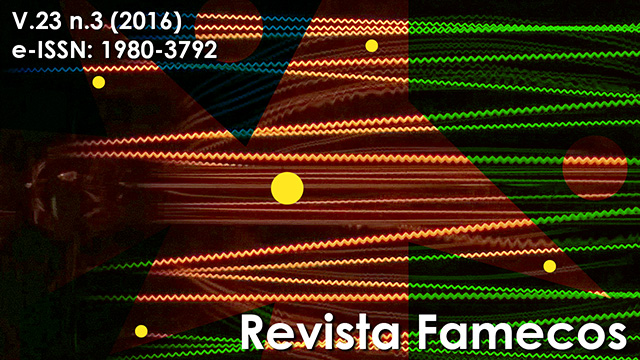On the trail of Chicago women: organic and radical connections of classic american pragmatism
DOI:
https://doi.org/10.15448/1980-3729.2016.3.22744Keywords:
Jane Addams, Classical pragmatism, FeminismAbstract
In our text we seek to find the programmatic links developed in Chicago at the turn of the twentieth century to a feminist vision of society as an organic whole. To this end, we revisit the contribution of Jane Addams, of the pioneers of American social theory. Although not directly associated with the Chicago School, her work was very influential to several authors of the School who also influenced her. Of these, we particularly highlight John Dewey as we establish the links between his thoughts on community, the focus of classic American pragmatism on communication and a feminist transformation of ethics. We conclude with a reference to urgency of rereading Addams and Dewey in their understandings of the community in the current neoliberal times that led to the recent closing of what was left, in practical terms, of Janes Addams’ important work on the communities she sought to develop and strengthen.Downloads
References
ADDAMS, Jane. Democracy and social ethics. New York: Macmillan Co, 1902.
______. The house of dreams. In: Peters, John Durham; Simonson, Peter. Mass communication and american social thought: key texts, 1919-1968. Lanham: Rowman & Littlefield, p. 25-30, [1901] 2004.
______. Twenty years at Hull-house; with autobiographical notes. Urbana: University of Illinois press, [1910] 1990.
CAMPONEZ, José Carlos. Entre verdade e respeito – por uma ética do cuidado no jornalismo. Comunicação e Sociedade, v. 25, p. 110-123, 2014. Disponível em: http://revistacomsoc.pt/index.php/comsoc/article/view/1863/1790 Acesso em: 19 maio 2015.
DEEGAN, Mary Jo. Jane Addams and the men of the Chicago School, 1892-1918. New Brunswick: Transaction, 1988.
DEWEY, John. How we think. In: Boydston, Jo Ann (Ed.). The middle works of John Dewey, 1899-1924, v. 6. Carbondale and Edwardsville: Southern Illinois University Press, p. 177-356, [1910] 1978.
______. The public and its problems. Athens: Swallow Press, [1927] 1991.
______. What I believe. In: Boydston, Jo Ann (Ed.). John Dewey: the later works, 1925- 1953, v. 5. Carbondale and Edwardsville: Southern Illinois University Press, p. 267-278, [1930] 1984.
______. Liberalism and social action. In: Boydston, Jo Ann (Ed.). John Dewey: the later works, 1925-1953, v. 11. Carbondale and Edwardsville: Southern Illinois University Press, p. 1-65, [1935] 1987.
______. Creative democracy – the task before us. In: Boydston, Jo Ann (Ed.). John Dewey: the later works, 1925-1953, v. 14. Carbondale and Edwardsville: Southern Illinois University Press, p. 224-230, [1939] 1988.
ELSHTAIN, Jean Bethke. Jane Addams and the dream of american democracy. New York: Basic Books, 2001.
FRANKLIN, Donna L. Mary Richmond and Jane Addams: from moral certainty to rational inquiry in social work practice. Social Service Review, v. 60, n. 4, p. 504-525, 1986.
DOI: http://dx.doi.org/10.1086/644396.
GILLIGAN, Carol. In a different voice: psychological theory and women’s development. Cambridge: Harvard University Press, 1982.
KNIGHT, Louise. Citizen: Jane Addams and the struggle for democracy. Chicago: University of Chicago Press, 2005.
LASCH, Christopher. Introduction to the social thought of Jane Addams. Indianapolis: Bohhs-Merrill, 1965.
LEVINE, Daniel. Jane Addams and the liberal tradition. Madison: State Historical Society of Wisconsin, 1971.
MILLER, Marjorie C. Pragmatism and feminism. In: Malachowski, Alan. (Ed.). The Cambridge companion to pragmatism. Cambridge: Cambridge University Press, 2013, p. 231-248.
OUT OF THE QUESTION. Disponível em: http://www.outofthequestion.org. Acesso em: 19 maio 2015.
PAPPAS, Gregory Fernando. Dewey and Feminism: The affective and relationships in Dewey’s ethics. Hypatia, v. 8, n. 2, p. 78-95, spring, 1993. Disponível em: http:// www.jstor.org/stable/3810338?seq=1#page_scan_tab_contents. Acesso em: 19 maio 2015.
ROWLAND, Allison L.; SIMONSON, Peter. The founding mothers of communication research: toward a history of a gendered assemblage. Critical Studies in Media Communication, v. 31, n. 1, p. 3-26, 2014. Disponível em: . Acesso em: 19 de maio de 2015. DOI: http://dx.doi.org/10.1080/15295036.2013.849355.
SEIGFRIED, Charlene Haddock. Where are all the pragmatist feminists? Hypatia, v. 6, n. 2, p. 1-19, 1991. DOI: http://dx.doi.org/10.1111/j.1527-2001.1991.tb01390.x.
SEIGFRIED, Charlene Haddock. Pragmatism and feminism: reweaving the social fabric. Chicago: University of Chicago Press, 1996.
______. Socializing democracy: Jane Addams and John Dewey. Philosophy of the Social Sciences, v. 29, n. 2, p. 207-230, jun. 1999. Disponível em: http://pos. sagepub.com/content/29/2/207.abstract. Acesso em: 19 de maio de 2015. DOI: http://dx.doi.org/10.1177/004839319902900203.
SILVEIRINHA, Maria João. Identidades, media e política. Lisboa: Livros Horizonte, 2004.
SIMONSON, Peter. Varieties of pragmatism and communication: visions and revisions from Peirce to Peters. In: Perry, David K. (Ed.). American pragmatism and communication research. Mahwah: Lawrence Erlbaum Associates, p. 1-27, 2001.
SHULER, Sherianne; TATE, Melissa. Intersections of feminism and pragmatism: possibilities for communication theory and research. In: Perry, David K. (Ed.). American pragmatism and communication research. Mahwah: Lawrence Erlbaum Associates, p. 209-223, 2001.
UPIN, Jane. Charlotte Perkins Gilman: instrumentalism beyond Dewey. Hypatia, v. 8, n. 2, spring, p. 38-63, 1993. Disponível em: http://www.jstor.org/stable/3810336seq=1#page_scan_tab_contents Acesso em: 19 maio 2015.
WHIPPS, Judy D. Jane Addams’s social thought as a model for a pragmatist-feminist communitarianism. Hypatia, v. 19, n. 2, p. 118-133, spring, 2004. Disponível em: https://muse.jhu.edu/article/170260 Acesso em: 19 maio 2015.
______. Pragmatist feminism. In: Zalta, Edward N. (Ed.). The Stanford encyclopedia of philosophy. Disponível em: <http://plato.stanford.edu/archives/fall2008/ entries/femapproach-pragmatism/>. Acesso em: 19 maio 2015.
Downloads
Published
How to Cite
Issue
Section
License
Copyright
The submission of originals to Revista Famecos implies the transfer by the authors of the right for publication. Authors retain copyright and grant the journal right of first publication. If the authors wish to include the same data into another publication, they must cite Revista Famecos as the site of original publication.
Creative Commons License
Except where otherwise specified, material published in this journal is licensed under a Creative Commons Attribution 4.0 International license, which allows unrestricted use, distribution and reproduction in any medium, provided the original publication is correctly cited.






